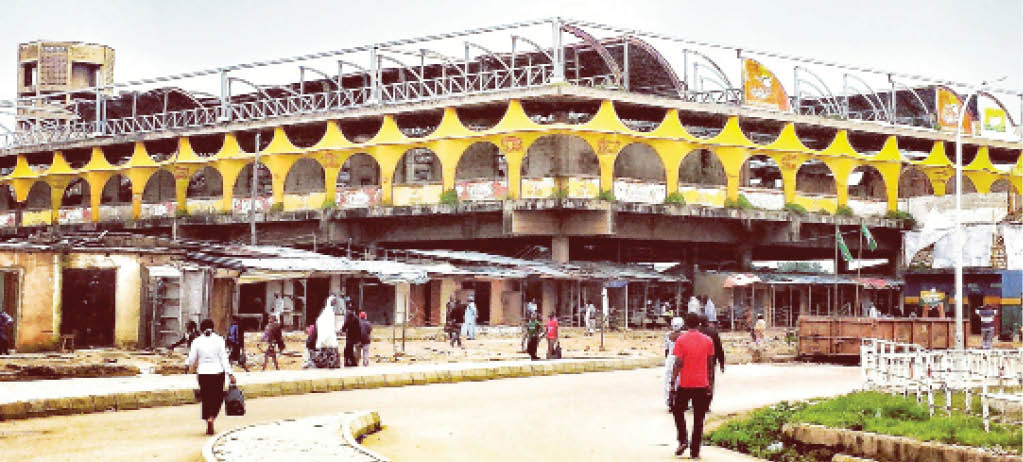The popular Jos ultramodern market, which was gutted by fire on February 12, 2002, has remained one of the most tragic occurrences to befall the state. The incident has caused economic losses and emotional trauma and, by extension, prevented the state from the business opportunities enjoyed before its destruction.
However, an MoU signed by the Plateau State Government and Jaiz Bank for the rebuilding of the market is being threatened by religious sentiments.
- Akeredolu to Ebiras in Ondo: Flush out criminals among you
- 3 dead, 10 injured as bus crashes on Abeokuta-Sagamu Expressway
The Jos Ultra-Modern Main Market was burnt during the administration of then Governor Joshua Dariye, and has been abandoned for almost two decades since then. Various allegations were raised on how the market got burnt considering the magnitude of the destruction vis-a-vis the building materials used for the project.
Thousands of traders from the market were forced to move to the roadsides and residential areas to transact their businesses. Those who occupy the roads within the city often cause unnecessary gridlock.
The transfer of the traders to residential areas resulted in an increase in the rate of rent around the market.
Since its destruction, reports say, various attempts to rebuild the market by successive governments in the state have been to no avail.
However, Governor Simon Lalong has, in the second year of his second term in office, entered into a public-private partnership (PPP) with Jaiz Bank to rebuild the market, and the parties have reached agreement on how to achieve the project.
But as the parties were about to sign the Memorandum of Understanding (MoU) on the project, individuals, politicians and groups including the Plateau State chapter of the Christian Association of Nigeria (CAN), have raised issues over the signing of the MoU, claiming that people were not sensitised on the project.
Some individuals and groups also accused the state government of ceding the market to an Islamic bank, adding that if the market was rebuilt, it would be handed over to settlers.
Disagreement among groups and other individuals began on social media platforms where users vehemently exchanged sentiments and abuses on the matter. While one side supported the government’s move, the other was against the handling of the project by Jaiz Bank.
The hullabaloo had attracted the attention of the state government which, in its reaction, said it didn’t cede the market to Jaiz Bank. It said all the allegations against the rebuilding of the market were not true and should be discarded.
In a statement issued on July 28, the state Commissioner for Information and Communication, Mr. Dan Manjang, explained that the MoU which was about to be signed between the government and Jaiz Bank was not meant to cede the market to the bank, adding that the rebuilding of the market would be of benefit to the state.
Manjang said: “The State EXCO mandated its relevant MDAs to carry out sensitization and awareness by engaging various stakeholders ahead of the signing of the MoU for rebuilding the Jos Main Market.
“The governor also personally engaged top religious, traditional, elders and other leaders of thought on the project knowing the passion that they have for the market which is a great heritage of the state.
“Regrettably, the outcome of this engagement has been twisted, politicised and reported under the caption “Governor Lalong cedes Jos Main Market to Islamic bank”. This has unnecessarily invoked passions and emotions portraying a false narrative that the state was parting with its cherished heritage to an Islamic bank,” the statement added.
The commissioner further said there was no need for anxiety, sentiments, misgivings, misconceptions and misrepresentation which are being pushed out by political forces that have resulted in name-calling, insults and hatred of both the government and individuals on social media and otherwise.
Why the project should be put on hold — CAN
Following the noise, allegations and counter-allegations on the handling of the project, the Plateau State chapter of the Christian Association of Nigeria (CAN) and coalition groups, held a press conference at the Government House, Little Rayfield.
The meeting was convened by the CAN State Chairman, Rev. Fr. Polycarp, with government officials and other groups in attendance.
According to the convener of the meeting, the agreement between the government and Jaiz Bank was ambitious and a detailed explanation needed to be given to make the general population understand why and how the project should be done by the bank.
According to Polycarp, many groups in the state said critical stakeholders were not consulted before the agreement was reached and there were issues to be clarified, advising that the reconstruction should be put on hold until proper consultation was done.
The CAN chairman said: “I convened this meeting in respect of what is happening on the social media with regards to Jaiz Bank. We felt that we should listen to the government on why things are going the way they are going and the government too should listen to our fears and concern.
“There is no way we will sit down and watch how lives and properties are mortgaged for 40 years. The youth have spoken their minds. We came to a conclusion that they (government) will go and redress this situation and look into our concerns until our fears are addressed, and until proper consultations are done.
“Their fear is this issue of Jaiz Bank, which is a non-interest bank. They raised the issue that the bank is Shari’a compliant and for our information, this is a Christian state. There are lots of these to be classified,’’ the chairman added.
Speaking on behalf of the government, during the meeting, Mr. Chrysanthus Ahmadu, the attorney general for the state, noted that Plateau people had been misinformed on the reconstruction contract, explaining that” the 40-year period is a sub-lease for the buyers to help them recoup their money from buying the shops, and at the end of the period, the property reverts to the market authority.
“Jaiz Bank Plc is just a financier; it is putting money for the contractor to do the job and at the end of it, they will sell 60 per cent while the government will sell 40 per cent,” he said, adding that “Jaiz Bank will finance the reconstruction of the market 100% without the Plateau State government required to pay a kobo.
“The land, which is over 7.4 hectares, is the only contribution the state government is making to the deal, which serves as equity.”
What traders, residents say about the project
Traders and residents have been expressing concern over the development, saying the noise was unnecessary, especially at a time the state had suffered from ethno-religious violence that crippled its economic activities.
Kachollom Gyang, said she didn’t see anything wrong with awarding the contract to Jaiz Bank because the bank doesn’t discriminate among its customers in transactions and or granting of loans from her experience.
She said: “Left for me, I don’t see anything wrong with Jaiz Bank building the market. It has always been my desire that traders be removed from the streets and the roadsides. They have occupied the roads and caused gridlock.
“The market in the state has been decentralized. You can’t see a market and say this is a market. I believe that government wants the progress of the state, and that is why it is making such efforts. The government must have looked at Jaiz Bank and known that it is capable of doing the job.
“My major problem with the government is it hasn’t properly enlightened the people on the project. It should come out and enlighten people on why and how the project is going to be executed. I believe that when this is done, the Plateau people will understand the government.”
Adamu Hassan Yusuf, vice chairman and a trader at Kasuwan Dare, located beside the burnt market, said he won’t be happy if the proposed reconstruction of the market was killed because it was an effort that they had been waiting for the past 20 years.
He said: “After the market was burnt, we moved to residential areas. The areas have become places where renting a small room is very expensive. A shop that you can rent at N5000 is now N150,000. This is not healthy for us because it affects our businesses. I call on those asking for the suspension or stoppage of the project to rethink.
“This is a development for everybody, irrespective of our ethno-religious affiliations. Let us put such differences aside.”
Another trader, Abubakar Salihu, a treasurer at Palluja Market, said: “When the news of the rebuilding came to us, we were all happy because we believe that businesses will return to the city.
“But all of a sudden, we started hearing that some people are against the project. Such a stance will not help us, rather it will deny development to everyone.
“The market has been there for the past 20 years and hadn’t changed anything. Let us cooperate with the government to ensure the success of the market.’’
Peter Azi, a Jos resident said: “The noise was as a result of the inability to adequately sensitize people on the project. The sensitization has to be done in the public because people don’t have much information about the MoU.
“But I believe that if people are well enlightened, they would understand that the project is a development for the state.”

 Join Daily Trust WhatsApp Community For Quick Access To News and Happenings Around You.
Join Daily Trust WhatsApp Community For Quick Access To News and Happenings Around You.

